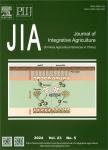Transcriptional search to identify and assess reference genes for expression analysis in Solanum lycopersicum under stress and hormone treatment conditions
Transcriptional search to identify and assess reference genes for expression analysis in Solanum lycopersicum under stress and hormone treatment conditions作者机构:Shaanxi Engineering Research Center for Vegetables/College of HorticultureNorthwest A&F UniversityYangling 712100ShaanxiP.R.China Henan Key Laboratory of Ion-Beam BioengineeringCollege of Agricultural SciencesZhengzhou UniversityZhengzhou 450000HenanP.R.China
出 版 物:《Journal of Integrative Agriculture》 (农业科学学报(英文版))
年 卷 期:2022年第21卷第11期
页 面:3216-3229页
核心收录:
学科分类:09[农学] 0902[农学-园艺学] 090202[农学-蔬菜学]
基 金:supported by the National Key Research and Development Program of China(2018YFD1000800) the National Natural Science Foundation of China(32072561) the Natural Science Foundation of Henan,China(222300420282)
主 题:tomato(Solanum lycopersicum) gene expression qPCR reference gene expression stability
摘 要:Tomato(Solanum lycopersicum)is a model plant for research on fruit development and stress response,in which gene expression analysis is frequently *** PCR(qPCR)is a widely used technique for gene expression analysis,and the selection of reference genes may affect the accuracy of results and even *** there have been some frequently used reference genes in tomato,it has been shown that the expressions of some of these genes are not constant in different tissues and environmental ***,little information on genomic identification of reference genes is available in ***,we mined the publicly available transcriptional sequencing data and screened out fifteen candidate reference genes,and the expression stability of these candidate genes and seven traditionally used ones were evaluated under stress and hormone *** results showed that over half of the selected candidate references were housekeeping genes in tomato *** the candidate reference genes and the traditionally used ones,the most stably expressed genes varied under different treatments,and most of these genes were recommended as preferred reference genes at least once except Solyc04g009030 and Solyc07g066610,two traditionally used reference *** study provides some novel reference genes in tomato,and the preferred reference genes under different environmental stimuli,which may be useful for future *** study suggests that excavating stably expressed genes from transcriptome sequencing data is a reliable approach to screening reference genes for qPCR analysis.



